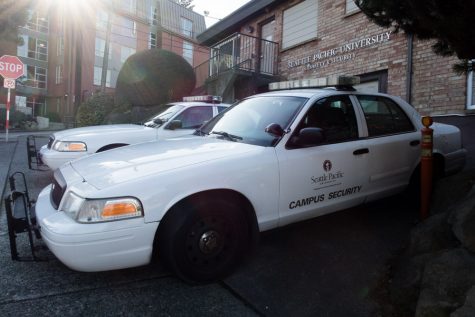Dry campus rule explained
March 4, 2020
The film “21 and Over” is a great example of the infamous college lifestyle: binge-drinking, and avoiding homework and class in an all-night chase to find Jeff Chang.
Most movies and TV shows depict college life in the exact same style where the college years are times of partying, experimenting and socializing with new people and substances.
“There are cultures of drinking in academic institutions. Often times there is overconsumption that is emphasized as a way to relieve stress,” Director of Residence life Gabe Jacobsen said.
But this image does not hold true at Seattle Pacific University, at least not publicly.
Unlike newly wet-campus Gonzaga University, SPU is noted as a dry campus — meaning alcohol and drug substances are banned on campus regardless of age.
“Alcohol is not conducive to a healthy academic environment,” Jacobsen said referring to the University policy and position.
The SPU community and administrators are committed to a safe campus that fosters learning and community, all of which are demonstrated in the Behavioral and Community Expectations page at spu.edu.

“The purpose of SPU’s alcohol, tobacco and drug use policy is to support the educational mission of the university with standards of personal health, moral integrity and social consciousness,” Jacobsen said.
Although these policies are set in place and students are required to adhere to these policies, alcohol and drugs are still present at SPU, just like any other college campus.
First and second year students are required to live in university provided residences — either the dorms or Campus Apartments and Housing (CHA) — where student resident advisors (RAs) foster communities that follow SPU policies.
“An RA might happen across something when they are on rounds or on call,” Jacobsen said.
Reports can also come from the Office of Safety and Security(OSS) if a student was walking unstably or other evidence insighting obvious detection. From there an official incident report is filed by OSS to the residence life office.
OSS responds to many scenarios in which they come to a resident location to take part in searches, or to control a situation and confiscate substances. Resident Life Coordinators are also at the site in order to handle the student side of the situation.
In a situation where a student under 21 is discovered to be intoxicated or in possession of drugs and alcohol, often times outside law enforcement are not involved.
“The university reserves the right to [involve law enforcement], but typically don’t,” Jacobson said.
Marissa LordahlBut in certain cases, the university is allowed to contact the Seattle Fire Department or emergency responders if a student is in a potentially harmful state, or if a situation is particularly dangerous.
As with any violation of SPU policy, these violations result in several consequences where students are asked to tackle a situation as a learning experience.
However, these violations warrant a fine to students. Students are issued a $100 fine that funds the educational component of alcohol and drugs. If students are unable to pay this fee, there is a waiver to appeal the fee.
Consequences are dependent on severity and frequency, but standard consequences include online education programs of alcohol and substances and then personalized questions about substance risk factors.
“These beginning phases are an educational approach to try and ensure that students are aware of university consequences and the effects of substances in college,” Jacobsen said.
These educational practices may involve a reflection where students are asked to write what they learned in the program.
“If there is damage done to the community we are aware of that,” Jacobsen said. These damages could be anything such as dorm furniture or other SPU property.
This student agreement applies to the student’s entire time at SPU, from enrollment to graduation.
“Technically, the student contract does transcend through summer during anytime of enrollment at SPU,” Jacobsen said.
For students who are of age, there are specific guidelines in order to keep the SPU campus a safe and drug- and alcohol-free zone. All components of this policy aim to foster a learning environment without interruptions
“We have requirements that they are drinking safely off campus and do not return to campus intoxicated,” Johnson said.
Whether a student is of age or under the legal age, alcohol policies apply in order to maintain a healthy working environment at SPU for all students.


























































































